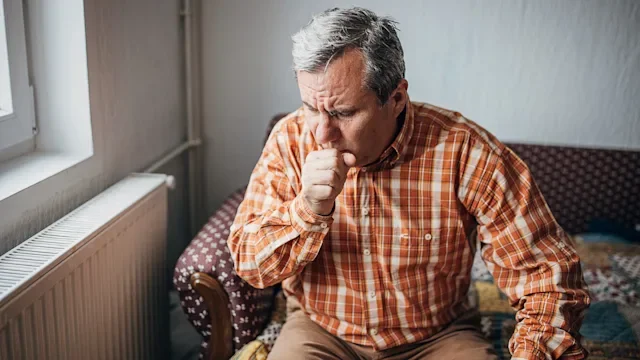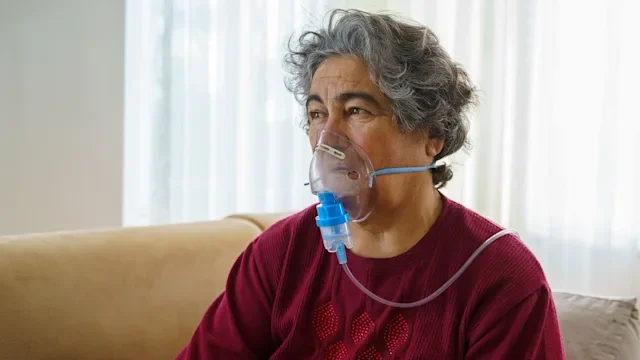Key takeaways:
Bronchitis and pneumonia are both types of lower respiratory infections. They can cause similar symptoms, like cough and trouble breathing.
Bronchitis won’t turn into pneumonia. But you can develop both at the same time. You can also develop pneumonia on top of bronchitis.
Get medical care if your bronchitis symptoms are getting worse. This may be a sign that you’ve developed pneumonia on top of bronchitis.
Bronchitis is a type of lower respiratory tract infection. When you’re sick with bronchitis, the tubes (bronchi) that connect your windpipe (trachea) to your lungs get irritated and fill with mucus. This leads to inflammation and symptoms like cough and shortness of breath.
If you’re sick with bronchitis, you may be wondering if your illness can get worse or if it can turn into something more concerning, like pneumonia. Bronchitis can’t turn into pneumonia. But it’s possible to develop both illnesses at the same time or one after the other. Here’s what you should know.
Can bronchitis turn into pneumonia?
Bronchitis and pneumonia are different illnesses. Bronchitis can’t turn into pneumonia or vice versa. But you can get sick with both illnesses, either at the same time or one after the other. This is often what people really mean when they ask if bronchitis can “turn into” pneumonia.
Here’s how you can get sick with both bronchitis and pneumonia.
Dual infection
Some people develop dual infections, which means they develop bronchitis and pneumonia at the same time. In these cases, the same virus causes both pneumonia and bronchitis. People quickly develop symptoms of both bronchitis and pneumonia and may feel very sick.
It’s not common to get bronchitis and pneumonia at the same time. You’re at higher risk for developing dual infections if you:
Are over age 65
Have a weakened immune system
Have underlying lung conditions
Misdiagnosis
Bronchitis and pneumonia can be hard to tell apart. Both illnesses can cause similar symptoms. They can also cause similar changes in how your lung sounds. A healthcare professional can detect these abnormal sounds during your physical exam, but they can’t always say for sure what’s causing them.
Another reason for possible misdiagnosis is that a chest X-ray may not be able to tell the difference between bronchitis and pneumonia at the start of an illness. So you may get diagnosed with bronchitis and later get diagnosed with pneumonia if your symptoms get worse. In reality, though, you had pneumonia the entire time.
Secondary or superimposed pneumonia
Some people develop bronchitis first and then develop pneumonia while they’re still sick with bronchitis. Usually, the pneumonia is caused by a different bug from the one that’s causing bronchitis.
Bronchitis isn’t contagious, but you are. You can pass the virus that causes bronchitis to others. Here’s how long you’re contagious.
Looking for relief from your bronchitis cough? Here are ways to treat your bronchitis at home.
Not sure what to expect from a bout of bronchitis? Three people tell GoodRx what it’s like to have bronchitis.
For example, bacteria more easily cause pneumonia when a person’s immune system is busy fighting off the virus that’s causing bronchitis. This is called a superimposed bacterial pneumonia.
In these cases, people may have mild symptoms at first and then become very sick after a few days. People can get very sick if they have a secondary pneumonia and need to start treatment with antibiotics as soon as possible.
What’s the difference between bronchitis and pneumonia?
Both bronchitis and pneumonia are types of lower respiratory tract infections. But the conditions affect different parts of your lower respiratory tract.

When you develop bronchitis, your bronchi become infected and inflamed. The bronchi are the tubes that connect your windpipe (trachea) to your lungs. Meanwhile, pneumonia is when the tiny sacs that make up your lungs (alveoli) become infected and inflamed.
There’s another form of bronchitis, called chronic bronchitis, that’s caused by irritants like cigarette smoke. Chronic bronchitis never really goes away. This is a different condition than acute bronchitis, which is what people develop when they get sick with a chest cold.
Bronchitis and pneumonia can both be caused by germs like viruses, bacteria, and fungi. Viruses are the most common cause of bronchitis and pneumonia. Bronchitis and pneumonia cause similar symptoms because they’re both lower respiratory tract infections.
Symptoms of both bronchitis and pneumonia include:
Fever
Cough
Phlegm (mucus)
Chest discomfort or tightness
Fatigue
Body aches
Headaches
Wheezing
Shortness of breath
But pneumonia can also cause more serious symptoms like:
High-grade fever
Trouble breathing, especially with movement
Chest pain
Nausea, vomiting, and diarrhea
Lightheadedness
Confusion
Quiz: Do I have pneumonia or bronchitis?
How common is it to develop pneumonia from bronchitis?
Most people don’t develop a secondary pneumonia on top of bronchitis. But you’re more likely to develop a superimposed bacterial pneumonia if you:
Are older than age 65
Smoke
Have a weakened immune system
Have an underlying lung condition, like asthma or chronic obstructive pulmonary disease (COPD)
Have a history of aspiration
How can you tell if your bronchitis is getting worse?
Bronchitis is usually caused by a virus. Bronchitis will get better on its own, but it can take up to 3 weeks for your symptoms to completely go away. Antibiotics and steroids won’t help you get better faster.
Even though it takes time to get back to normal, you should notice that you feel a little bit better each day. Worsening symptoms or new symptoms can be a sign that your bronchitis is getting worse or that you’re developing a secondary pneumonia.
You should get medical care if you develop:
A new or worsening fever
A return of fever that had previously resolved
New or worsening shortness of breath
New or worsening trouble breathing
Chest pain
Weakness
Confusion
Inability to eat or drink
How can you prevent bronchitis and pneumonia?
Staying up-to-date with vaccinations can lower your risk of developing bronchitis and pneumonia. Talk with your healthcare team about whether or not you should get vaccinated for:
Respiratory syncytial virus (RSV)
Other steps you can take to avoid getting sick with viruses that can cause bronchitis and pneumonia include:
Wash your hands frequently.
Avoid touching your face (especially your eyes, nose, and mouth).
Avoid close contact with people who are sick.
Avoid crowded, indoor gatherings during cold and flu season.
Frequently asked questions
A viral chest infection is a term people may use to describe acute viral bronchitis. Bronchitis and pneumonia are separate medical conditions. Bronchitis can’t turn into pneumonia. But you can have both infections at the same time or develop pneumonia on top of bronchitis.
Respiratory infections include things like the common cold, sinusitis, and acute bronchitis. None of these conditions will “turn into” pneumonia. But the viruses that cause these illnesses can infect multiple parts of your respiratory system at the same time. So it’s possible to develop pneumonia and another respiratory infection at the same time.
It’s also possible to develop pneumonia on top of another type of respiratory infection. This is sometimes called a superimposed or secondary pneumonia.
Both pneumonia and bronchitis can cause fever. Acute viral bronchitis usually causes a low-grade fever. But some people with bronchitis don’t develop a fever. People who have pneumonia may not develop a fever. They may also develop low-grade or high-grade fevers. More serious forms of pneumonia are more likely to cause high fever.
A viral chest infection is a term people may use to describe acute viral bronchitis. Bronchitis and pneumonia are separate medical conditions. Bronchitis can’t turn into pneumonia. But you can have both infections at the same time or develop pneumonia on top of bronchitis.
Respiratory infections include things like the common cold, sinusitis, and acute bronchitis. None of these conditions will “turn into” pneumonia. But the viruses that cause these illnesses can infect multiple parts of your respiratory system at the same time. So it’s possible to develop pneumonia and another respiratory infection at the same time.
It’s also possible to develop pneumonia on top of another type of respiratory infection. This is sometimes called a superimposed or secondary pneumonia.
Both pneumonia and bronchitis can cause fever. Acute viral bronchitis usually causes a low-grade fever. But some people with bronchitis don’t develop a fever. People who have pneumonia may not develop a fever. They may also develop low-grade or high-grade fevers. More serious forms of pneumonia are more likely to cause high fever.
The bottom line
Bronchitis and pneumonia are both lower respiratory tract infections, but they affect different parts of the respiratory system. Both can be caused by viruses and cause similar symptoms. Bronchitis doesn’t “turn into” pneumonia. But you can develop both infections at the same time.
You can also develop pneumonia on top of bronchitis. Secondary pneumonia can be caused by bacteria and lead to serious illness. Older adults and those with weakened immune systems or lung conditions are at higher risk for developing secondary pneumonia.
Get immediate medical care if you develop new or worsening fever, trouble breathing, shortness of breath, or chest pain. These are signs that your bronchitis is getting worse or that you’ve developed pneumonia.

Why trust our experts?


References
American Lung Association. (2025). Learn about acute bronchitis.
Dasaraju, P. V., et al. (1996). Infections of the respiratory system. Medical Microbiology.
Powers, L. A., et al. (2025). Secondary pneumococcal disease in veterans with viral respiratory infections. Clinical Infectious Diseases.
Wootton, D., et al. (2014). The diagnosis of pneumonia requires a chest radiograph (X-ray)—yes, no or sometimes? Pneumonia.
Xu, Z., et al. (2025). Age-specific patterns of infection, co-infection and pneumonia risk in acute respiratory infections: An active surveillance study in China, 2023-2024. Journal of Medical Virology.














